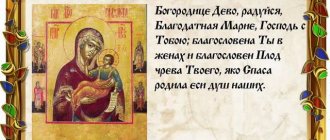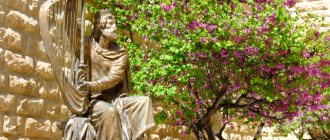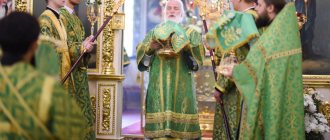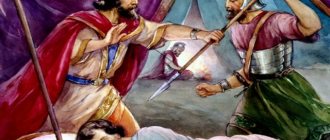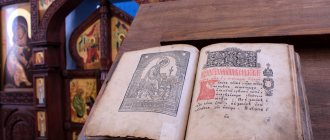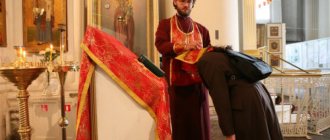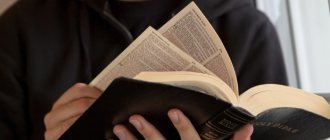How does prayer help?
In total, the book of the Bible of the same name contains more than a hundred prayers; they differ in theme and number of lines. Therefore, there is a tradition according to which certain psalms help in different circumstances.
- Protect from creditors.
- Helps get rid of fears.
- With their help, you can improve family relationships.
- Believers find their own housing and solve problems with work.
All human life can be ordered by the Lord if there is sincere faith in the heart. Only she brings to life the words written by King David.
Psalm 26, 50, 90 With text (Live to help)
ABOUT THE POWER OF PSALMES 26 AND 90.
“Well, I’ll tell you what! You once told me that the enemy was shooting his arrows at you. Do not be afraid! None of them will touch you, don’t be afraid of any rubbish: rubbish will remain rubbish. Just take my advice as a rule, listen: read in the morning and evening before your prayer both of these psalms - the 26th and the 90th, and before them the great Arkhangelsk joy - “Virgin Mother of God, rejoice.” If you do this, neither the fire will take you, nor the water will drown you... At these words, the elder stood up from his chair, hugged me and with some special strength, in a rolling ringing voice, he didn’t even say, but shouted out: “I’ll tell you more: it won't explode with a bomb! I kissed the old man’s hand that hugged me. And he again, pressing himself close to my ear, again exclaimed loudly: “And the bomb won’t explode!” And don’t pay any attention to any rubbish: what can rubbish do to you? This is what I wanted to talk to you about. Well, now go with the Lord!..” Spiritual instructions of Elder John of Optina. Pray, brothers and sisters! #Living in help,> #90 psalm listen to Athanasius the Great: “And salvation is our Lord Jesus Christ himself, who leads us into a new age, prepares us to reign with Him.” As a powerful weapon against demons, Psalm 90 has been tested by many generations of Christians. Morning prayers with text here - https://ikoni.cerkov.ru/utrennie-molitvy/ Why does this psalm occupy a special place? Psalm 50
Two main dangers.
Morning prayers in Russian (translation) https://www.youtube.com/watch?v=2miTS...>
How to learn prayer. Instructions (step by step) from the Holy Fathers. God's Law Lesson 33
Psalm 33. I will bless the Lord at all times
About one terrible sin
About predetermination of fate
Akathist to the Icon of the Mother of God “The Tsaritsa”
Akathist to Saint Nicholas the Wonderworker
I'm going to confession in the temple. (Example of confession).
Morning and evening of a Christian
https://youtu.be/KZLbYbo_VDw
Learning not to get irritated https://www.youtube.com/watch?v=wknmQ...>
How not to harm yourself
Severe punishment for this sin
?list=PLL…>
Archimandrite John (Krestyankin) Experience of constructing a confession https://ikoni.cerkov.ru/arximandrit-io...>
How to pray as a lay person during the liturgy.
Prayer to Spyridon Trimifuntsky the Wonderworker. Join us.
Signs of true repentance
The fate of the soul after death.
How to pray as a lay person during the liturgy
On our website “Icons of the Mother of God” you can submit notes for commemoration in the church (only for the baptized) https://ikoni.cerkov.ru/zapiski-v-xram....>
Church calendar - https://ikoni.cerkov.ru/category/cerko... to receive messages about each new video on the channel, you need to click on the bell icon next to the “Subscribed” button.
2) By clicking on “Like” and “Tell your friends” you are greatly helping to spread the Word of God! Save me, God! #Orthodoxy. href=»/results?search_query=%23%D0%9F%D1%80%D0%B0%D0%B2%D0%BE%D1%81%D0%BB%D0%B0%D0%B2%D0%BD %D1%8B%D0%B9″ class=”yt-uix-sessionlink » data-url=”/results?search_query=%23%D0%9F%D1%80%D0%B0%D0%B2%D0%BE %D1%81%D0%BB%D0%B0%D0%B2%D0%BD%D1%8B%D0%B9″ data-sessionlink=»itct=CDQQ6TgYACITCKGr3PT0-d8CFc8PsgodhNoGgyj4HQ»>#Orthodox
channel
3) Now we are on Twitter; https://twitter.com/lyhhram Join us! 4) On our website “Icons of the Mother of God” you can submit notes for commemoration in the church (only for the baptized) https://ikoni.cerkov.ru/zapiski-v-xram...> Orthodoxy is our faith. Our Father is our main prayer, the Bible is our main book. The gospel is our good news of salvation. The Creed is a prayer book that contains all the basic provisions and dogmas of the Orthodox Church. Jesus Christ is the head of the Kingdom of God founded by Him, called the Church, in which believers are saved...What do Christians believe about the Holy Trinity? In the simplest terms, Christians believe that there is only one God, and that God exists in three Persons. These three Persons are God the Father, God the Son, God the Holy Spirit.
Psalm 26 in Russian
1. Psalm of David. The Lord is my light and my salvation: whom shall I fear? The Lord is the strength of my life: whom shall I fear? 2. If evildoers, my opponents and my enemies come against me to devour my flesh, then they themselves will stumble and fall. 3. If a regiment takes up arms against me, my heart will not fear; if war arises against me, then I will hope. 4. One thing have I asked of the Lord, this only do I seek, that I may abide in the house of the Lord all the days of my life, to contemplate the beauty of the Lord, and to visit His temple, 5. For He would have hidden me in His tabernacle in the day of trouble, He would have hidden me in in the hidden place of His dwelling, He would lift me up onto a rock. 6. Then my head would be lifted up above the enemies surrounding me; and I would offer sacrifices of praise in His tabernacle, and would begin to sing and make melody before the Lord. 7. Hear, O Lord, my voice with which I cry, have mercy on me and listen to me. 8. My heart says from You: “Seek My face”; and I will seek Your face, O Lord. 9. Hide not Your face from me; do not reject Your servant in anger. You were my helper; do not reject me and do not forsake me, O God, my Savior! 10. For my father and my mother have forsaken me, but the Lord will receive me. 11. Teach me, O Lord, Thy way and guide me on the path of righteousness, for the sake of my enemies; 12. Do not hand me over to the mercy of my enemies, for false witnesses have risen up against me and are breathing malice. 13. But I believe that I will see the goodness of the Lord in the land of the living. 14. Trust in the Lord, be of good courage, and let your heart be strengthened, and trust in the Lord. (Psalm 27:1-14)
We read the Psalter. Psalm 26
Audio |
Conversation with Archpriest Alexy Ladygin about the Psalter. – I would like to thank you, dear TV viewers, for your high assessment of our program.
In many churches in the Moscow region I meet Orthodox Christians, parishioners of these churches, who constantly watch our program. They ask me to convey my bow and gratitude to the priests taking part in our program, which I do with great pleasure: I thank Archpriest Alexy Ladygin, rector of the church in the name of St. Euphrosyne, Grand Duchess of Moscow, for participating in our program. – We sincerely thank you for the attention that TV viewers pay to us. All the programs that you do open up the Divine world, and through them our Orthodox Christians from different regions can communicate with priests, hear their thoughts about very important spiritual things, and this is currently worth a lot: although modern people receive a lot of information, little what is useful for him, and what can be seen and heard in the programs that air on the Soyuz TV channel is both saving and wise.
– In fact, the Soyuz TV channel has become that very public television, the need for which is constantly talked about (of course, we have Public Television, an all-Russian channel, but when I watch its programs, I come to the conclusion that the Soyuz TV channel is more deep and varied in content). May my colleagues forgive me, but this is true! Moreover, it is actually created with public money, with donations from our TV viewers and all those who are not indifferent to the fate of public Orthodox television. Many thanks to them for this!
– What is the meaning of public television? Probably to be closer to the people. One can criticize public television: it is becoming scholastic, documentary and purely television, but not popular. And the Soyuz TV channel is people's television: it talks about people's lives, about the life of the regions; this can be seen through parish life, through the lives of people from different cities, towns and villages. And this, of course, is a great achievement of the Soyuz TV channel. You know, so far no one can show the true life of our outback, but here we can look at it all and draw certain conclusions, see faces; after all, what a person lives by is always reflected on his face.
– Thank you, father! We continue to analyze the Psalter, and the topic of our program: the 26th Psalm.
– With God’s help, dear brothers and sisters, we have already talked about the 25 psalms, trying to penetrate into the depths of the thoughts, experiences and prayers of the holy prophet and psalmist David. Psalm 26 is also very deep in its content.
We often say that King David wrote psalms mainly about his early, very deep experiences, when he was on the verge of life and death: he was persecuted by Saul, the Lord chose him. We know that the Psalmist earned this chosenness through his labor, patience, and desire to fulfill the Law and follow the will of God in everything. And King David’s experiences are always connected precisely with what he had to experience: he had to hide, run away, live among pagans, an infidel people, which was not encouraged in those days (why, we will talk about this later).
The 26th Psalm talks about what sorrows and difficulties a person can experience, where and in what he should look for support in his life and on whom to rely. The psalmist David, who experienced great difficulties, says that we should not trust “in princes and in the sons of men, in them there is no salvation” and “every man is a lie,” he understands that those closest to you can betray you, even your parents can leave you, and only the Lord will always be with you. And King David emphasizes that every person should trust in the Lord.
These are the words with which the psalm begins: “The Lord is my enlightenment and my Savior, whom will I fear?” The psalmist says that the Lord gives strength, enlightens a person, protects him with His Divine light, gives him a vision of how to act in this or that case. If the Lord is with you, if He leads you, then you no longer need to be afraid of anyone in life; you just need to seek for God to be with you, to illuminate and enlighten your eyes, so that they can see where you should go, what to do and how it is possible to solve what is happening to you.
“The Lord is the Protector of my life, from whom shall I fear?” Here the psalmist David says: “I am not afraid or afraid of anyone. I’m not afraid: the Lord will protect me, He gives me the opportunity to live, my whole life is in the hands of God.”
We are repeatedly convinced of this when we read in the Holy Scriptures about God’s great Providence for every person, about his protection and protection of everyone, that even our hair is all numbered, and without the will of God not one of them can fall from our head. This is the protection and guardianship of the Lord for each of us! But this happens when a person lives with God, trusts in Him, and fulfills God’s commandments. He is in the hands of God, and he has nothing to fear: nothing will happen in his life without the will of God, the Lord will never leave such a person.
This psalm gives very strong hope and hope to any of us that there will be no random incidents in our lives, we just need to be with God. And if we do not live with the Lord, then we must be afraid of everything, you can be subjected to any tests, because God leaves you, and you go out alone into battle with all the evil, untruth, and random circumstances of life.
“Those who are angry will always approach me and destroy my flesh; those who insult me and defeat me will become weak and fall.” The psalmist says that those who want to harm him and take his life are approaching him, but these enemies will fall: King David never trusted in human relationships, but always sought God. And the Lord helped him, stood up for him, and the prophet knew that his Defender was God, therefore with Him there was always victory over the enemy, and over Saul, and over the internal enemy - over the enemy of the human race, who also confused the Psalmist, trying to inspire thoughts that could lead him to despondency, but he drove them away with his trust in God. When he had this hope, all his enemies were defeated: both visible and invisible.
“Even if a regiment (a regiment used to be called a whole army) takes up arms against me, my heart will not fear.” Here the psalmist David emphasizes: “I will not be afraid, even if a whole army takes up arms against me: the Lord stands behind me. And if God leads me, if He is with me, then nothing can harm me, not even a whole army.”
“If a battle arises against me...” If the regiment represents visible enemies, then the battle is already an invisible army. Warfare happens inside our hearts. And when our enemies fight us, we are overcome by bad thoughts, we are embarrassed, then in any case, “I trust in Him,” that is, always, no matter how scared we are, we must have hope in the Lord, Who will never shame the one who turns to Him.
Why are we talking about the Psalter? Why do we encourage people to read it and be strengthened by it? Because the psalmist David says to everyone: “Even if you have some difficulties in life, if people rise up against you (even if it’s a whole regiment!), then don’t let your heart be afraid, and don’t be embarrassed, don’t be discouraged, and don’t fight your internal battle alone, but be sure to trust in the Lord, turn to Him, and He will help you.” King David tells us that we must know where to look for protection and hope, and a truly believing person understands: the Lord never leaves His children.
King David also says that if the Lord helps, warms with warmth and protects from all evil with His love, then his heart will always be close to God. And the most beloved and worthy place where the psalmist would like to stay is, of course, the temple of God: “I have asked one thing of the Lord, this I will require: that I may dwell in the house of the Lord all the days of my life, that I may behold the beauty of the Lord and visit the holy temple His". There is no place more beautiful, more comforting, warmer and more joyful than the temple of God, where the Lord will lighten your soul, instill hope, open the path along which you need to go, and you will walk along it confidently. Therefore, a person should most of all want to dwell in the house of the Lord. And here lies the answer of the psalmist David for everyone living in the modern world and wanting to avoid many troubles: if you want to be a conqueror of evil, sorrow, illness and difficulties, then you must love to be in the temple of God. If you do not have such love, ask the Lord to open it to your heart and so that the desire to dwell in the house of the Lord takes root in it.
“For He hid me in His habitation in the day of my evils; He hid me in the secret of His habitation, and lifted me up upon a stone.” The psalmist David explains why he so wants to live in the house of the Lord, why it is most dear to him and why the beauty of the house of God is close to his heart: the Lord protects and helps. Despite all the enemies, the hopeless situation in which King David found himself, the Lord still helps him, “puts him on a stone,” that is, makes him higher than others: the military leader stood on the stone so that everyone could see and hear him and know about his height his position, about the honor that he has. And it was God who gave all this to the Psalmist, and he is grateful to the Lord for this.
“And now, behold, you have lifted up my head against my enemies: I have died and devoured in His village a sacrifice of praise and shouting: I will sing and sing praises to the Lord.” These are also amazing words. What does it mean to “lift up my head against my enemies”? We understand that someone who is confident, who is not afraid of anything, and whose conscience is clear, walks with their head raised. And the one who experiences sadness and difficulties has his head down: sorrows chain him to the earth, and he no longer looks at the sky, being in sadness. The psalmist David says that he trusts in God, and the Lord helps him and gives him the opportunity to walk with his head raised. The prophet says: “I will sing and make praise to the Lord.” That is, he will sacrifice to God those praises and glorifications that will come from the depths of his heart.
“Hear, O Lord, my voice in which I cried; have mercy on me and hear me.” David asks the Lord to hear his voice and have mercy on him. The Lord may not accept praise from us if we bring them to Him out of pride and vanity. And if a person brings them with love and humility, then, of course, the Lord will hear him. And although we are not always pure, we do not always live in truth and do not always fulfill God’s commandments, but our heart so wants to praise the Lord that we ask that the Lord show us His mercy, hear us and accept our praises, because we bring them with great love and gratitude to Him.
“My heart says to you: I will seek the Lord, I will seek your face, O Lord, I will seek your face.” The psalmist David says: “My face will seek Your face, O Lord. I will praise Your face to face, my heart is so rejoicing, so filled with love and gratitude and so pure that I am not ashamed to look at Your face, Lord, because I give You thanks with all my heart. I want to praise the Lord face to face!”
“Do not turn Your face away from me and do not turn aside in anger from Your servant: be my Helper, do not reject me and do not forsake me, O God of my Savior.” Here the Psalmist says: “All my trust, all my hope is only in You, Lord! My praises are bright and pure. Lord, I completely trust in You, and my whole life is in Your hands. Without You I mean nothing, so do not turn Your face away, do not leave me alone, do not be angry with me, Lord. Although at times I may not be worthy of Your mercy, be my Helper. My whole life and my salvation are in Your hands.”
These are indeed very profound words, because the Psalmist cannot imagine his life without God. He does not want to rely on his own strength, on his friends, on his capabilities and position. All his life he trusts only in the Lord, and he becomes afraid that the Lord may move away from him, turn away, turn His face away from him, because then he will have nothing to trust in and King David will not have the strength to resist all the untruths, all lawlessness, the evil that surrounds him.
“For my father and mother have forsaken me, but the Lord will receive me.” The psalmist says here that the Lord never leaves a person who trusts in Him. Even parents can leave their child - both father and mother turned away from King David when Saul rebelled against him, but the Lord never leaves His own, and we read about this repeatedly in the Holy Scriptures. “Even if a mother forgets her childhood, I will not forget you,” says the Lord (even if a mother can fall into some kind of oblivion and forget about her child, then the Lord will never forget about him). “Ordain me, O Lord, in Thy way and guide me on the right path for my enemy’s sake.” The psalmist David turns to the Lord so that He teaches him to fulfill the commandments, the entire Law that He gave to man, for only by fulfilling it can one receive grace from God.
“Do not betray me to the souls of those who afflict me: for I have stood up as a witness of unrighteousness, and lied untruthfully to myself. I believe in seeing the good of the Lord on the land of the living. Be patient with the Lord, be of good courage, and let your heart be strong, and be patient with the Lord.” Here, of course, the psalmist David speaks very profound words. At the end of our reflection, I would like to dwell on them in more detail. “Be patient with the Lord, be of good courage, and let your heart be strong, and be patient with the Lord.” Why is it said, “Be patient with the Lord”? As interpreters say, the Lord does not immediately give us what we ask, and a person must patiently wait for what he asks God for. The words “be patient with the Lord” mean exactly that: to wait with patience.
The Lord does not immediately give mercy. He will definitely give it, but you must expect it, pray and not give up. Many people say: “I asked God, but He gave me nothing!” And the Lord tests the human heart, because if it is strengthened in such patience and love for God, then the Lord will certainly send what is asked.
– Thank you very much, father! An amazing psalm that really calls us to be patient, because we very often want to get everything at once. Especially in the modern world, when the media simply imposes that a person should receive everything immediately. No, nothing happens right away: everything good is obtained only through patience and labor, and therefore I sincerely wish everyone, through patience, through work, through your prayers, to receive mercy from the Lord.
Presenter Lyubov Akelina
Recorded by Evgenia Osiptsova
How to read Psalm 26 correctly
Work as a courier at Yandex.Eda (up to 3,400 rubles per shift) leave a request →
There are situations when a person is attacked by unclean spirits. They plant in a person’s soul and mind the desire to deviate from God’s laws. Then the wise holy fathers recommend reading the text of Psalm 26 - in Russian or Church Slavonic, this does not play a decisive role.
If you do this every day, the attacks will soon weaken and stop altogether. Only prayer must be constant - at least for a month. There is a known case when reading Psalms 26, 90 and 50 saved a famous writer and his family during a bombing (during the 2nd World War). The famous elder John of Optina Pustyn advised him to read these prayers.
So the prayer Psalm 26 saves not only from spiritual invisible enemies, but also from those who are trying to harm Christians in the physical world. What does it say? Any Orthodox Christian who has attended services has repeatedly heard these sublime lines. They say that the Lord is the main protector of life. And since He is great, Christians have no one to fear, either in this life or in eternity.
With these words, the author not only defends himself, but also glorifies the Creator of the universe, demonstrating to his enemies that he has firm hope and support. The text will become more understandable if you imagine the complex and dangerous fate of King David before he became the heir to the throne. After all, his predecessor wanted to destroy the young man, because he was afraid of his claims to the throne.
In his heart, the believer wants only one thing - to glorify the greatness of the Lord by visiting the temple, observing His beauty and perfection. So everyone must find the love of God within themselves, then no enemy will be afraid!
- Prayer of Living Help - ;
- Psalm 50 - text in Russian;
- The Sleepless Psalter about health - how to order.
Psalm 26. Psalm 26. In what situations is it appropriate to read?
The situations below can serve as a good precursor to reading or listening to Psalm 26:
